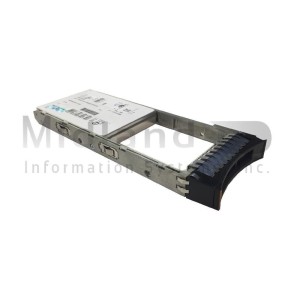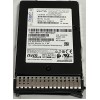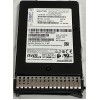ES0D-9179 IBM SSD 387GB SFF-2 with eMLC Enterprise Solid State Drive Power Systems
ES0D-9179 387GB SFF-2 IBM SSD with eMCL is a SFF 2.5" SAS Solid State Drive that is formatted with 528 byte sectors, and reports as 58B9 CCIN. The ES0D-9179 387GB IBM SSD is supported in SFF-2 SAS bays in the IBM EXP24S 5887 I/O drawer for an iSeries. The IBM ES0C and ES0D are physically identical drives but have different feature codes specify how the SSD is used. ES0C indicates usage by AIX, Linux or VIOS. ES0D indicates usage by IBM i Power systems. The ES0D-9179 387GB SFF-2 IBM SSD with eMLC is only sold in refurbished or used condition. All IBM iSeries systems and parts are IBM Certified and eligible for IBM Maintenance contracts and include warranty.
ES0D Part Numbers: Part Numbers: 49Y7471, 74Y9524, 74Y9525, 74Y9526
Note: The ES0D IBM i 387GB SFF-2 SSD with eMLC cannot be used in #5802/#5803 I/O drawers or in system unit SFF SAS bays due to physical difference in Gen1 and Gen2 carriers. Also drive was not tested with 512 byte sectors and thus JBOD mode for AIX/Linux is not supported
The ES0D is also supported on the following IBM i Power iSeries models: 8202-E4B, 8202-E4C, 8202-E4D, 8205-E6B, 8205-E6C, 8205-E6D, 8231-E1C, 8231-E1D, 8231-E2C, 8231-E2D, 8233-E8B, 8286-41A, 8286-42A, 8408-E8D, 9080-MHE, 9080-MME, 9109-RMD, 9117-MMB, 9117-MMC, 9117-MMD, 9119-FHB, 9119-MHE, 9119-MME, 9179-MHB, 9179-MHC, 9179-MHD
The newer higher-performance 387 GB SSD (ES10, ES11, ES19, ES1A) can replace the existing 387 GB (ES0A, ES0B, ES0C, ES0D) in most IBM Power systems. The 2x larger capacity 775 GB SSD (ES0E, ES0F, ES0G, ES0H) has the same higher performance characteristics of the new 387 GB SSD, but also can potentially reduce the number of SAS controllers and SAS bays for the same capacity and lower energy usage. The new 387 GB and 775 GB SFF SSDs are the third generation of eMLC technology offering significant performance, capacity, and price-to-performance advantages. Using faster and more powerful technology, they offer up to 2X more IOPS capacity than the existing second-generation eMLC SSD technology. The new third-generation SSD also deliver up to 40% better latency.
Enterprise Multi-Level Cell (eMLC) flash memory blends enterprise-class performance and reliability characteristics with the more cost-effective characteristics of MLC flash storage. The new third-generation SSD builds upon this base and, using advances in both the SSD device controller flash memory management plus advances in MLC technology itself, offer an even better value proposition. Like IBM's earlier eMLC SSDs, the drives are designed to deliver great sustained performance levels and extended endurance and reliability. For example, the new eMLC SSD modules were designed to provide 24x7x365 usage even running write-intensive levels for about five years. Typical client usage is expected to be much lower, especially regarding the average percentage of writes, and thus drive life span can be much longer.
Four feature codes are used for the 387 GB drive to identify the type of SFF (2.5-inch) SAS bay and the operating system that will use the drive. If used in a POWER7 or POWER7+ system unit or a 12X-attached #5802/5803 I/O drawer, then features #ES10/ES11 are used and named SFF-1. If used in a #5887 EXP24S storage drawer, then #ES19/ES1A are used and named SFF-2. Because the SAS bays differ physically, SFF-1 and SFF-2 drives are not interchangeable. Features #ES10 and #ES19 are used to order SSDs for AIX , Linux , or VIOS. Features #ES11 and #ES1A are used to order SSDs for IBM i. Features #ES10 and ES11 are identical and physically interchangeable, but two features are used to help IBM configuration tools understand the usage and slightly different configuration rules under the different operating system environments. Likewise, features #ES19 and #ES1A are identical and physically interchangeable. Similarly, four feature codes are used for the 775 GB SSD. #ES0E/ES0F are the SFF-1 features. #ES0G/ES0H are the SFF-2 features. #ES0E and #ES0G are the AIX , Linux , or VIOS features. #ES0F and #ES0H are the IBM i features.
The new third-generation SFF SSDs (387 GB and 775 GB) are supported on POWER7 and POWER7+ models 710, 720, 730, 740, 750, 760, 770, 780, and 795 (B, C, and D models). They are also supported on PowerLinux 7R1/7R2/7R4 servers, but have different feature codes (#EL00, EL19, #EL3E, #EL3G) for configuration/proposal reasons. The new third-generation SSF SSDs are supported by the SAS controllers integrated in the system units of the Power 710 through 780. These SSDs are also supported by the following IBM PCI SAS adapters:
#ESA3 PCIe2 1.8 GB Cache RAID SAS Adapter Tri-port 6 Gb
#5913 PCIe2 1.8 GB Cache RAID SAS Adapter Tri-port 6 Gb
#ESA1/ESA2 PCIe2 RAID SAS Adapter Dual-port 6 Gb
#5805/5903 PCIe 380 MB Cache Dual x4 3 Gb SAS RAID Adapter
#5904/5906/5908 PCI-X DDR 1.5 GB Cache SAS RAID Adapter
#5913 PCIe2 1.8 GB Cache RAID SAS Adapter Tri-port 6 Gb
#ESA1/ESA2 PCIe2 RAID SAS Adapter Dual-port 6 Gb
#5805/5903 PCIe 380 MB Cache Dual x4 3 Gb SAS RAID Adapter
#5904/5906/5908 PCI-X DDR 1.5 GB Cache SAS RAID Adapter
Note: The increased performance levels of the third-generation SSDs may have SAS adapter configuration considerations unless the SSDs are not very busy. Older SAS controllers or adapters can support fewer busy third-generation 387 GB or 775 GB SFF SSDs than compared to the maximum quantity of busy first- or second-generation (69 GB or 177 GB) SSDs from a full performance perspective. Of course, the PCIe Gen2 SAS adapters can run a higher quantity of SSDs than the older comparable PCIe Gen1 SAS adapters. The CCIN numbers assigned to the third-generation SFF 387 GB SSD are identical to the second-generation. SFF-1 #ES0E/ES0F and #ES0A/ES0B use CCIN 58B8 and SFF-2 #ES0G/ES0H and #ES0C/ES0D use 58B9. Performance analysts who tune configurations where two generations of these SSD are installed may want to check AAS/WTAAS records in addition to looking at reports based on just CCIN information.
The 387 and 775 GB SFF SSDs can be located on the same SAS controller as other capacity SSDs assuming there are available SAS bays. SSDs and HDDs cannot be mixed in the same array. Different capacity SSDs cannot be mixed in the same array. Generation 2 and generation 3 387 GB SSD can be intermixed in the same RAID array. The new 387 GB and 775 GB SSDs are shipped from IBM formatted to 528 byte sectors. Reformatting to 512-byte sectors (JBOD) is not supported.
OS400 System requirements:
IBM i V7R2 or higher
IBM i V7R1 7.1.0 machine code: RS710-10 OS & (RS710-E LIC or Technology Refresh 4 (TR PTF Group SF99707 Level 4), Fix Level: C2115710
IBM i V6R1 6.1 with i 6.1.1 machine code - i 6.1.1: RS610-10 OS & RS611-H LIC C2122610
IBM i V7R1 7.1.0 machine code: RS710-10 OS & (RS710-E LIC or Technology Refresh 4 (TR PTF Group SF99707 Level 4), Fix Level: C2115710
IBM i V6R1 6.1 with i 6.1.1 machine code - i 6.1.1: RS610-10 OS & RS611-H LIC C2122610
Attributes provided: 387GB SFF-2 SSD formatted with 528 byte formatting
Attributes required: One SFF-2 SAS bay
Attributes required: One SFF-2 SAS bay



